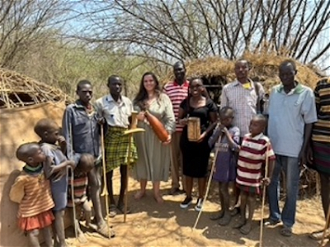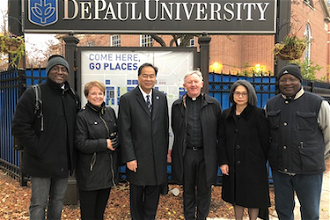Empowering Grassroots Conflict Resolution & Peacebuilding

Paula Soumaya Domit during her internship with Shalom-SCCRR.
Julie L Butler writes: Recently Rev Dr Patrick Devine, International Chairman and Founder of the Shalom Center for Conflict Resolution and Reconciliation (Shalom-SCCRR), was invited to Harvard University's John F Kennedy School of Government, also known as the Harvard Kennedy School, to talk about the success of Shalom-SCCRR's unique approach to conflict resolution efforts in eastern Africa with Paula Soumaya Domit, a Harvard Master of Public Policy (MPP) Candidate, and International Consultant for Shalom-SCCRR.
Originally from Roscommon, Ireland, Fr Devine was ordained as a priest into the Society of African Missions (SMA) in 1988. A strong believer that education would help his mission for sustained peace and development in Africa, he completed a PhD in Political Science and Public Administration, a MA in Peace Studies and International Relations, a BD in Theology, a Diploma in Mission Studies, and a BA in Sociology, History and Philosophy. He was the SMA Regional Superior for Tanzania and Kenya from 1995-2008, and the Chair of the Religious Superiors Conference of Kenya (RSCK) and Secretary General from 2005-2012. Recently, he was elected Vice Chairman of Tangaza University College (TUC) Council and Chairman of TUC Corporate Affairs, having been a teaching professor from 2009-2021.
In 2009, Rev Dr Devine founded Shalom-SCCRR in Kenya. A peacebuilding, inter-religious, non-governmental organization (NGO), it is composed of highly educated peacebuilding practitioners, who work in the eastern African member countries of the Intergovernmental Authority on Development (IGAD) which include Djibouti, Eritrea, Ethiopia, Kenya, Somalia, South Sudan, Sudan, and Uganda. It was created to transform protracted extreme inter-ethnic systemic conflict in eastern Africa, where people were killed, injured, or displaced, which debilitated many communities, and due to chronic widespread violence following the disputed Kenyan elections in 2007-2008. Fr Devine stressed: "It is very difficult to promote sustained development where humanitarian institutions become periodically inoperable or destroyed, which is why conflict transformation is essential for social development and reconciliation." He chose the name 'Shalom' because "Shalom is a Hebrew word centered on peace, justice and reconciliation being integrated."
In 2013, Fr Devine was honoured with the prestigious International Caring Award and previous recipients include Mother Teresa, Dalai Lama, Bill Clinton, and Pope Francis. The honorary guest speaker who gave him this award was 'General' and 'Secretary' Colin Powell, the 65th United States Secretary of State and first African-American to hold this position, the 15th National Security Advisor, and the 12th chairman of the Joint Chiefs of Staff. He praised Fr Devine for his exemplary work helping the poor through his successful peacebuilding and sustainable developmental efforts in eastern Africa.
Paula Soumaya Domit is a Mexican/Lebanese Master of Public Policy (MPP) Candidate and Belfer Young Leader at the Harvard Kennedy School. Her academic and professional experiences have focused on pursuing international peace and security through human-centric international legal strategies. She has specialized in international disarmament processes at the United Nations in New York and Geneva, working on treaty negotiation and implementation on topics spanning the international arms trade, conventional arms in conflict zones, and regulatory frameworks for Artificial intelligence (AI) and emerging technology. In addition, she has worked with civil society organizations and research institutions around the world to produce robust analysis and interventions for a more peaceful, less militarized world. Because of her interest in exploring the divide between strategic policymaking for peace and grassroots interventions, she was awarded Harvard's Juster Fellowship and Women in Public Policy Fellowship to spend three months in Kenya with Shalom-SCCRR, where she worked on direct, community-led peacebuilding. She now continues her peace work as a Shalom-SCCRR International Consultant.
Together, they discussed how Shalom-SCCRR works to resolve conflict, poverty, and structural violence by leading an international team of conflict resolution experts in Kenya and neighbouring countries. As Rev Dr Devine explained the Shalom-SCCRR methodology, Paula enthusiastically shared her personal internship experience, whereby she saw how successful these theories worked, when applied, 'in action and on the ground'.
Rev Dr Devine explained: "Shalom believes peace is not just the absence of physical violence - mere negative peace - but rather strives to create conflict resolution." Our Philosophy is guided by the reality "that conflicts are essentially about inadequately met, basic and ontological human needs. It upholds the principle that attainment of negative peace or conflict settlement, needs to be followed up by reconciliation among the parties so that peace can endure." Our goal "is driven by the need to work for positive peace, where all sides are committed to the well-being, development, and security of each other. This requires breaking down barriers, including those dealing with human rights and the environment, in the belief that unmet human needs, which are not addressed, eventually contribute to physical violence. Shalom aims for the deep-rooted transformation in society of conflict-generating actors and structures."
Since its inception, Shalom-SCCRR has successfully trained over 24,000 community leaders and local influential opinion-shapers in conflict transformation skills and peacebuilding techniques. As a result, they have collaborated with their communities to implement over 600 school/infrastructure development projects, to build, upgrade, expand or electrify/solarize as needed.
Recently, Shalom-SCCRR received the prestigious accreditation honor from the United Nations (UN) for 'integrity & methodology'. This enables Shalom-SCCRR to work with 1,500 associated United Nations accredited NGO's (non-governmental organization) to further their conflict resolution and peacebuilding efforts, on a broader scale.
Many international universities have benefited from modules and lectures taught by Fr Devine on Shalom-SCCRR's sustainable peacebuilding methods, some of which include Catholic University of Eastern Africa (CUEA), DePaul University (Chicago), Edward Kennedy Institute at the National University of Ireland (Maynooth), George Mitchell Institute at Queen's University Belfast (Northern Ireland), Harvard John F Kennedy School of Government, Harvard Law School, Harvard Negotiation and Mediation Clinical Program, Stellenbosch University (South Africa), University of San Diego, University of Texas (Austin), and more. In the future, he hopes to expand his teaching modules and engagements worldwide.
The lecture was attended by students from all over the world, including Austria, Columbia, Germany, Ireland, Latvia, Lebanon, Mexico, Northern Ireland, Russia, South America, Spain, the United States, South Vietnam and more. It was clear, from their genuine interest, these students were going to be the next global leaders of our future. It was inspiring to witness how much they cared about being part of the solution for global peace. They found great promise in the Shalom-SCCRR conflict resolution peacebuilding tools, and openly brainstormed potential ways to use them to resolve global conflict, not only in Africa, but around the world. Although Rev. Dr. Devine supported this perception, he stressed their success in Africa was a result of the willingness of each antagonist to create common ground and negotiate, to build long-term sustainable grassroots peace.
Rev Dr Devine stressed, throughout the world, one of the biggest challenges concerning ongoing conflict and peacebuilding efforts is "there is an imperative need for conflict transformation processes to ever remember that conflict has a memory that is resilient, robust, trans-generational, and moored in culture. Unfortunately, it is frequently contaminated and distorted with erroneous historical narratives and mendacious reporting. Plus, demonization and hypocrisy, where practiced, have potential calamitous consequences, hindering, even preventing, the evolution of conflict transformation, and peacebuilding progress. These unconscionable malpractices also have to be transformed if road maps to conflict settlement and resolution are to be achieved."
Fr Devine thanked Paula Soumaya Domit for her excellent intern service, for sharing her experience with the group, and for her continued peace work as an International Consultant for Shalom-SCCRR, describing her as, "Inspirational beyond words!" They agreed the future development of eastern Africa is very promising and optimistic. He invited everyone to eastern Africa, to visit or to do an internship, to experience first-hand, how these peace interventions are improving millions of lives in the conflict zones.
In closing, Rev Dr Devine reminded us: "for the dignity of humanity, we have to keep trying, for it is in our best interest to work together, to find a way to co-exist, with the hope that peace, justice, and long-term reconciliation, will eventually take deep root, in a way that will move us all, neighbor or country, toward the 'greater good' for the benefit of us all."
One last consideration, given the current global migration crisis around the world, of people in search for a better place to live, with the hope of more opportunity, Rev Dr Devine's Shalom-SCCRR work is more critical than ever. Instead of searching for another place to live, he helps communities 'bloom where they are planted' and gives them the practical tools to be self-sustaining through personal and collective empowerment, so they can be the architects of their destiny. What better place to do this, than in their own community, in the place they know, love, and cherish. In the future, the Shalom-SCCRR peacebuilding approach, which provides communities with the skills necessary to build and develop their own country, holds more lasting promise than people migrating, with the hope of a brighter future, which may, or may not happen.
Julie L Butler is a freelance writer who lives in Northwest, CT. She is a Pontifex University Doctor of Theology candidate, and a Franciscan University of Steubenville Spiritual Director candidate. She has completed a MA in Theology at Holy Apostles College & Seminary, and a BS in Speech Communications at the University of Utah.
LINK
Shalom Center for Conflict Resolution and Reconciliation: https://shalomconflictcenter.org


















